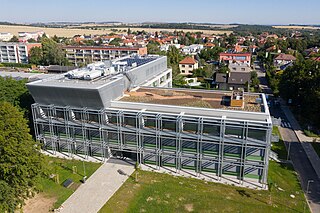A bachelor's degree or baccalaureate is an undergraduate degree awarded by colleges and universities upon completion of a course of study lasting three to six years. The two most common bachelor's degrees are the Bachelor of Arts (BA) and the Bachelor of Science. In some institutions and educational systems, certain bachelor's degrees can only be taken as graduate or postgraduate educations after a first degree has been completed, although more commonly the successful completion of a bachelor's degree is a prerequisite for further courses such as a master's or a doctorate.

The Miguel Hernández University, is a Spanish Public University offering education, research and services facilitating the comprehensive development of its students. It is located in the province of Alicante and was established in 1996. Its name commemorates the Spanish poet Miguel Hernández.

The Agusan del Sur State College of Agriculture and Technology (ASSCAT) is a chartered state university in Bunawan, Agusan del Sur, Philippines through Republic Act (RA) No. 7932 approved on March 1, 1995, and RA No. 11586.

Animal science is described as "studying the biology of animals that are under the control of humankind". It can also be described as the production and management of farm animals. Historically, the degree was called animal husbandry and the animals studied were livestock species, like cattle, sheep, pigs, poultry, and horses. Today, courses available look at a broader area, including companion animals, like dogs and cats, and many exotic species. Degrees in Animal Science are offered at a number of colleges and universities. Animal science degrees are often offered at land-grant universities, which will often have on-campus farms to give students hands-on experience with livestock animals.

Tamil Nadu Agricultural University (TNAU) is the state agricultural university of Tamil Nadu located in Coimbatore, Tamil Nadu, India.

Savonia University of Applied Sciences is a local municipality-owned Finnish institution of higher education based in the cities of Kuopio, Iisalmi and Varkaus.
A Bachelor of Economics is an academic degree awarded to students who have completed undergraduate studies in economics. Specialized economics degrees are also offered as a "tagged" BA (Econ), BS (Econ) / BSc (Econ), BCom (Econ), and BSocSc (Econ), or variants such as the "Bachelor of Economic Science".

Bahauddin Zakariya University (BZU) (Urdu: جامعۂ بہاءالدین زکریا) is a public university with its main campus located in Multan, Pakistan. Bahauddin Zakariya University was founded in 1975 as Multan University, and is the 2nd largest university in Punjab. It was renamed in 1979 in honour of a Sufi saint Baha-ud-din Zakariya (1171-1262).

The University of Agricultural Sciences and Veterinary Medicine of Cluj-Napoca (USAMVCN) is a university in Cluj-Napoca, Romania. With around 6,000 students, the university offers 21 undergraduate programs; all are available in Romanian, 2 in French and 1 in English. Additionally, the university offers 23 Master programs.

Dr. Balasaheb Sawant Konkan Krishi Vidyapeeth, formerly Konkan Krishi Vidyapeeth, is an agricultural university at Dapoli in Ratnagiri district of the Indian state of Maharashtra. It was established on 18 May 1972 as Konkan Krishi Vidyapeeth, and got its present name on 12 February 2001 in memory of third Chief Minister of Maharashtra Shri. P. K. Sawant. Its research centre at Karjat has developed some patented varieties of rice. Its major focus areas are rice, horticulture and fisheries. In 1997, it received the Best Institute Award of the Indian Council of Agricultural Research. Dr. SD Sawant is the 14th Vice Chancellor of this University, he was appointed by Chancellor Ch. Vidyasagar Rao on 7 March 2019.

Wayamba University of Sri Lanka is the thirteenth national university in Sri Lanka. It was established as the Affiliated University College of North Western Province in 1991 and after it was become the Rajarata University of Sri Lanka "Wayamba mandapa" in 1996.It was a full flagged university naming as Wayamba University of Sri Lanka in 1999. The main purpose of the university is offering English-medium degree, diploma and certificate courses in areas such as Agriculture, Applied Science, Management and Technology for students and working professionals. The courses are highly up-to-date and job-oriented.

The College of Agriculture and Bioresources is a faculty at the University of Saskatchewan in Saskatoon, Saskatchewan.

Inholland University of Applied Sciences is a large university of applied sciences located in eight main cities of the Randstad, the central-western region of the Netherlands and the country's economic, political and cultural hub. With over 37,000 students from more than 100 countries, the university follows the applied sciences mode of education.

Sokoine University of Agriculture (SUA) is a public university in Morogoro, Tanzania, specializing in agriculture. The university is named after the country's second prime minister Edward Sokoine.

The Tarlac Agricultural University (TAU), formerly the Tarlac College of Agriculture, is a public university in the province of Tarlac, Philippines. It is mandated to provide professional, technical and instruction for special purposes and to promote research extension services and progressive leadership in agriculture, agricultural education, home technology and other related fields. Its main campus is located in Malacampa, Camiling, Tarlac.
North Carolina State University's College of Agriculture and Life Sciences (CALS) is the fourth largest college in the university and one of the largest colleges of its kind in the nation, with nearly 3,400 students pursuing associate, bachelor's, master's and doctoral degrees and 1,300 on-campus and 700 off-campus faculty and staff members.

The Central Bicol State University of Agriculture, or simply referred to by its acronym CBSUA, is a state university in the province of Camarines Sur, Philippines, and is the regional center for higher learning in agriculture in the Bicol Region.
The Colorado State University College of Agricultural Sciences includes five academic departments and offers nine undergraduate majors with many concentration options as well as multiple graduate degree programs. People in the College of Agricultural Sciences lead research and design projects in food production, security, and safety, ecosystem health, landscape design, and human well-being. They also provide extension and participate in engagement in agricultural sciences and landscape architecture.

The Faculty of Tropical AgriSciences (FTA) is a part of the Czech University of Life Sciences Prague (CZU). The Faculty was established in 2013 by the transformation of the Institute of tropics and subtropics (ITS). The current dean is prof. dr. ir. Patrick Van Damme. Prof. Patrick Van Damme became the second dean of the Faculty of Tropical AgriSciences (FTA) but the first dean ever as a foreign national in the history of the Czech Republic. The Faculty is located in the campus of the CZU in Prague, the Czech Republic.

The Lilongwe University of Agriculture and Natural Resources (LUANAR) is a university outside Lilongwe, Malawi. It was formed in 2011 by a merger between Bunda College of Agriculture of the University of Malawi and Natural Resources College (NRC).














